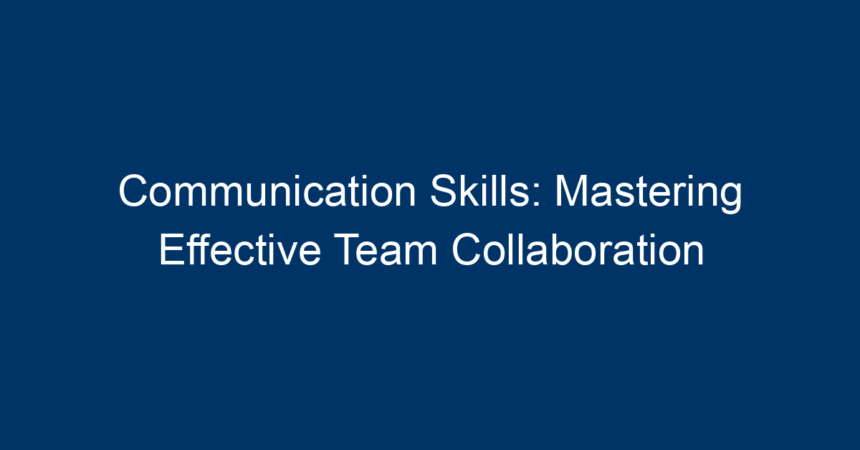Effective team collaboration is at the heart of every successful organization. In today’s fast-paced and interconnected work environment, mastering communication skills is not just an asset but a necessity. Whether you’re leading a project, contributing to a team, or fostering workplace relationships, strong communication skills can dramatically enhance collaboration, productivity, and morale. In this article, we’ll explore the importance of communication skills in team settings, actionable strategies to improve them, and how to cultivate a culture of collaboration.
Understanding the Importance of Communication Skills
In any team, clear and effective communication is paramount. It serves multiple crucial functions:
-
Clarity and Understanding: Well-defined communication ensures that every team member understands their roles, responsibilities, and goals. Miscommunication can lead to confusion, reduced efficiency, and increased frustration.
-
Conflict Resolution: Teams will inevitably face conflicts. Strong communication skills allow team members to navigate disagreements constructively, fostering a healthier work environment.
-
Enhanced Collaboration: Good communication promotes trust and camaraderie among team members, essential ingredients for effective collaboration. When team members communicate openly, they are more likely to share ideas and take initiative.
- Boosted Morale: A team with strong communication practices typically exhibits higher morale. Employees feel valued when their voices are heard and their contributions acknowledged.
Key Communication Skills for Team Collaboration
1. Active Listening
Active listening is more than just hearing words; it involves comprehending and responding thoughtfully. Here’s how to practice it:
- Maintain Eye Contact: This shows you are engaged and interested.
- Provide Feedback: Paraphrase what you’ve heard to confirm understanding.
- Avoid Interruptions: Allow others to express themselves fully before responding.
2. Clear and Concise Messaging
Being articulate and straightforward is critical. Here’s how to enhance this skill:
- Use Simple Language: Avoid jargon unless everyone understands it.
- Be Direct: Get to the point quickly without unnecessary filler.
- Tailor Your Message: Consider your audience and adjust your communication style to suit their preferences.
3. Non-Verbal Communication
Much of our communication is non-verbal. Body language, gestures, and facial expressions can convey a lot. Understanding this can help in several ways:
- Pay Attention to Others: Observe their body language to gauge their feelings.
- Be Mindful of Your Non-Verbal Cues: Your expressions and gestures should align with your verbal messages.
- Stay Open and Approachable: A friendly demeanor encourages open communication.
4. Empathy and Emotional Intelligence
Empathy allows you to understand and relate to your team members’ feelings. It’s essential for fostering a supportive environment:
- Acknowledge Emotions: Recognize when team members may feel overwhelmed or stressed.
- Be Supportive: Offer assistance or a listening ear when someone is struggling.
- Validate Contributions: Encourage others by acknowledging their efforts and insights.
Building an Environment That Fosters Communication Skills
Creating a culture that supports strong communication skills is essential for effective collaboration:
1. Promote Open Dialogue
Encourage a culture where team members feel safe to express their thoughts and ideas:
- Regular Check-Ins: Schedule frequent team meetings to discuss progress and concerns.
- Anonymous Feedback Channels: Provide options for team members to share feedback without fear of repercussion.
2. Provide Training and Resources
Investing in communication training can yield tremendous benefits:
- Workshops: Organize workshops focused on developing specific communication skills, such as conflict resolution or public speaking.
- Online Resources: Share articles, videos, and books that can enhance communication skills among team members.
3. Emphasize Team-Building Activities
Team-building activities can significantly improve relationships and communication:
- Icebreakers: Use fun, engaging activities to help team members get to know each other better.
- Collaborative Projects: Assign tasks that require team members to work closely together, fostering teamwork and communication.
Overcoming Communication Barriers
There are various barriers to effective communication that teams may encounter:
1. Language Differences
In diverse teams, language can be a barrier. Encourage:
- Clarification: Urge team members to ask questions if they do not understand a point.
- Language Training: Offer language assistance or resources for team members who may need support.
2. Technology Challenges
With remote work on the rise, technology can sometimes hinder communication:
- Provide Training on Tools: Ensure team members are comfortable and proficient with communication tools (like Slack, Microsoft Teams, etc.).
- Encourage Face-to-Face Interaction: When possible, opt for video calls to foster a more personal connection.
3. Personality Clashes
Different personalities can lead to misunderstandings:
- Conduct Personality Assessments: Share insights about different working styles and preferences among team members.
- Promote Flexibility: Encourage team members to adapt their communication styles based on those they work with.
Conclusion: Turning Communication Skills into Team Success
Mastering communication skills can be transformative for teams, leading to improved collaboration, increased efficiency, and a more positive work environment. By prioritizing active listening, clarity in messaging, awareness of non-verbal cues, and empathy, team members can significantly enhance their collaborative efforts.
To cultivate this environment, promote open dialogue, provide ongoing training, and engage in team-building exercises that strengthen relationships. Overcoming barriers to communication, whether they stem from language, technology, or personality differences, is also crucial.
In summary, effective team collaboration hinges on robust communication skills. Take actionable steps today to improve these skills within your team and watch your organization thrive. Embrace the power of communication and unlock the full potential of collaboration!




